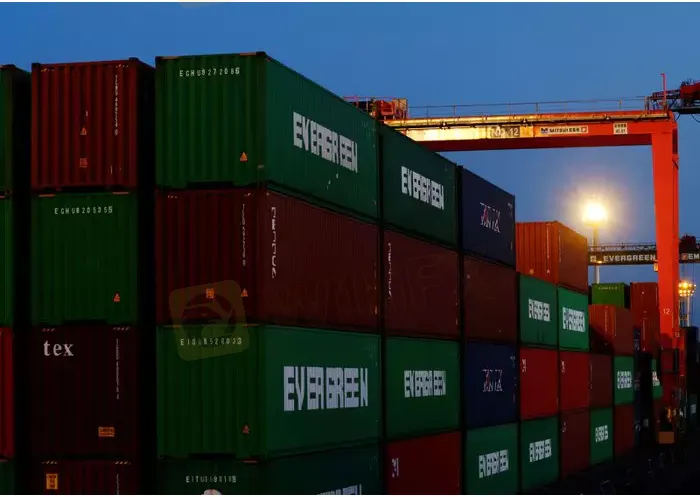简体中文
繁體中文
English
Pусский
日本語
ภาษาไทย
Tiếng Việt
Bahasa Indonesia
Español
हिन्दी
Filippiiniläinen
Français
Deutsch
Português
Türkçe
한국어
العربية
Japan posts $10 billion trade gap in June as energy imports surge
Abstract:Japan ran a trade deficit for the 11th straight month in June as high energy and other commodity costs pushed up imports, highlighting growing economic pressures from a sharply declining yen and global inflation.

apan ran a trade deficit for the 11th straight month in June as high energy and other commodity costs pushed up imports, highlighting growing economic pressures from a sharply declining yen and global inflation.
Imports surged 46.1% in the year to June, Ministry of Finance data showed on Thursday, slightly above a median market forecast for a 45.7% gain in a Reuters poll.
That outpaced a 19.4% year-on-year rise in exports in the same month, resulting in a 1.3838 trillion yen ($9.99 billion) trade deficit, the 11th straight month of shortfalls.
Junes deficit was smaller than the 1.510 trillion yen gap expected in a Reuters poll.
Imports swelled due to a surge in shipments of oil from Saudi Arabia and coal and liquefied natural gas (LNG) from Australia. Imports of LNG from Malaysia and coal from Indonesia posted triple-digit surges, the data showed.
“Import volumes outpaced export volumes across Q2 so net trade should have been a small drag on Q2 GDP (gross domestic product) growth,” said Marcel Thieliant, senior Japan economist at Capital Economics.
“Car exports remain the Achilles heel of Japans manufacturing sector as they were only up 0.4% year-on-year, but that marked at least a pick-up from the 7.9% year-on-year fall in May,” he added.
By region, exports to China, Japans largest trading partner, rose 8.3% in the 12 months to June, recovering from two months of declines on stronger shipments of chip parts. China-bound exports of cars posted a sharp 23.2% year-on-year decline, the data showed.
Shipments bound for the United States, the worlds largest economy, gained 15.7% in June, thanks to stronger exports of medical products.
The Bank of Japan is expected to maintain its ultra-loose monetary policy later on Thursday, a commitment that could lead to further falls in the yen.
While the yen‘s slide against the U.S. dollar and other currencies this year has pushed up import costs, Japan’s economy is still projected to have returned to growth in the second quarter following a decline in January-March.
However, the recovery from the COVID-19 pandemic faces headwinds from slowing global growth, lower exports and persistent supply chain snags.
That has forced policymakers to maintain sufficient stimulus in the economy, going against a global tide of rate increases to rein in rampant inflation.
($1 = 138.4600 yen)

Disclaimer:
The views in this article only represent the author's personal views, and do not constitute investment advice on this platform. This platform does not guarantee the accuracy, completeness and timeliness of the information in the article, and will not be liable for any loss caused by the use of or reliance on the information in the article.
Read more

Russia to Fully Ban Crypto Mining in 10 Regions Starting January 1, 2025
Starting from January 1, 2025, Russia will implement a comprehensive ban on cryptocurrency mining in 10 regions for a period of six years. The ban will remain in effect until March 15, 2031.

Why is there so much exposure against PrimeX Capital?
In recent months, PrimeX Capital, a Forex and CFD broker established in 2022, has become a subject of concern in the trading community. However, despite these enticing features, the broker's reputation has been severely tarnished by multiple complaints and a troubling lack of regulatory oversight.

The Hidden Checklist: Five Unconventional Steps to Vet Your Broker
Forex broker scams continue to evolve, employing new tactics to appear credible and mislead unsuspecting traders. Identifying these fraudulent schemes requires vigilance and strategies beyond the usual advice. Here are five effective methods to help traders assess the legitimacy of a forex broker and avoid potential pitfalls.

Doo Financial Obtains Licenses in BVI and Cayman Islands
Doo Financial, a subsidiary of Singapore-based Doo Group, has expanded its regulatory footprint by securing new offshore licenses from the British Virgin Islands Financial Services Commission (BVI FSC) and the Cayman Islands Monetary Authority (CIMA).
WikiFX Broker
Latest News
AIMS Broker Review
The Hidden Checklist: Five Unconventional Steps to Vet Your Broker
Russia to Fully Ban Crypto Mining in 10 Regions Starting January 1, 2025
YAMARKETS' Jingle Bells Christmas Offer!
Why is there so much exposure against PrimeX Capital?
MTrading’s 2025 "Welcome Bonus" is Here
Doo Financial Obtains Licenses in BVI and Cayman Islands
CFI’s New Initiative Aims to Promote Transparency in Trading
Currency Calculator


